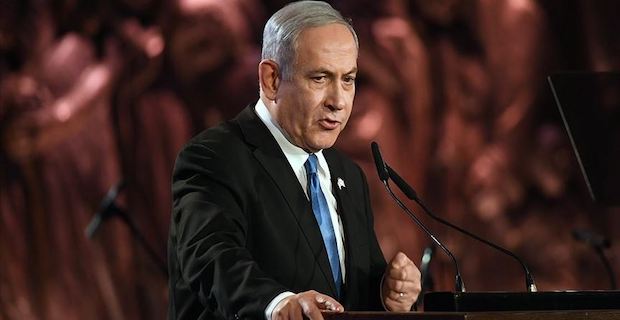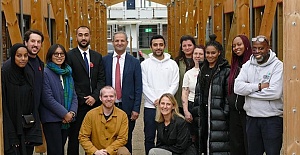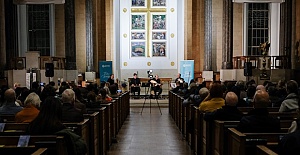Israeli Prime Minister Benjamin Netanyahu said Wednesday that the U.S. peace plan foresees the proposed Palestinian capital being located in Abu Dis, a neighborhood on the outskirts of Jerusalem, which the U.S. recognizes as Israel’s undivided capital.
According to Makan 33, an Israeli television channel, Netanyahu answered reporters’ questions about the so-called peace plan after a joint press conference with U.S. President Donald Trump in the capital, Washington, D.C.
"The capital of the Palestinian State will be Abu Dis, in East Jerusalem,” he said.
"Israel will dominate all Jewish settlements in the West Bank.”
Netanyahu said the U.S. has set certain conditions on Palestinians for the start of negotiations, including recognizing the Jewish state, recognizing Israel's sovereignty over Jerusalem and giving up the absolute right to return.
He said the U.S. has demanded that Palestine disarm Gaza, drop payments to Palestinian detainees and martyrs’ families, calling them terrorists, stop filing complaints at the International Criminal Court and not become a member of an international organization without Israel's approval
Netanyahu stressed that without fulfilling these conditions, there will be no change in Area C of the West Bank.
“At the same time, Israel will apply its laws to the Jordan Valley, to all Jewish communities in Judea and Samaria and to other areas that the plan designates as part of Israel and which the United States has agreed to recognize as part of Israel,” he said.
Netanyahu noted that they promised not to build a new settlement or expand construction activity in Area C for four years.
Under the 1995 Oslo Accords between Israel and the Palestinian Authority, the West Bank, including East Jerusalem, was divided into three portions – Area A, B and C.
Israel prevents Palestinians from conducting construction projects in parts of the West Bank designated as Area C under the agreement, which falls under administrative and security control of Israel.
Area C is currently home to 300,000 Palestinians, the vast majority of whom are Bedouins and herding communities who predominantly live in tents, caravans and caves.
International law views the West Bank and East Jerusalem as "occupied territories" and considers all Jewish settlement-building activity there illegal.


 After Nesil Caliskan a by-election will be held in Jubilee ward in Enfield
After Nesil Caliskan a by-election will be held in Jubilee ward in Enfield Publishing the analysis, Labour’s Cllr Ergin Erbil said Everybody in Enfield deserves basic rights
Publishing the analysis, Labour’s Cllr Ergin Erbil said Everybody in Enfield deserves basic rights Gaza-Israel conflict Statement from Cllr Ergin Erbil, Leader of Enfield Council
Gaza-Israel conflict Statement from Cllr Ergin Erbil, Leader of Enfield Council Cllr Ergin Erbil was elected as the new Leader of Enfield Council
Cllr Ergin Erbil was elected as the new Leader of Enfield Council The European Union called on Turkey to uphold democratic values
The European Union called on Turkey to uphold democratic values Turkish citizens in London said Rights, Law, Justice
Turkish citizens in London said Rights, Law, Justice The Council of Turkish Cypriot Associations Geneva response letter
The Council of Turkish Cypriot Associations Geneva response letter Sustainable Development and ESG, Will This Become the Course for Turkic World
Sustainable Development and ESG, Will This Become the Course for Turkic World Saran Media And Euroleague Basketball Extend Media Rights Partnership for Four More Years
Saran Media And Euroleague Basketball Extend Media Rights Partnership for Four More Years Will Rangers be Jose Mourinho’s next victim?
Will Rangers be Jose Mourinho’s next victim? Jose Mourinho's Fenerbahce face Rangers on Thursday
Jose Mourinho's Fenerbahce face Rangers on Thursday Inzaghi stated that they felt the absence of our national player Hakan Çalhanoğlu
Inzaghi stated that they felt the absence of our national player Hakan Çalhanoğlu Barclays has become the biggest UK lender so far to cut mortgage rates
Barclays has become the biggest UK lender so far to cut mortgage rates THE SPRING STATEMENT EXPLAINED, UK ECONOMIC OUTLOOK AND GROWTH FORECASTS
THE SPRING STATEMENT EXPLAINED, UK ECONOMIC OUTLOOK AND GROWTH FORECASTS Launch of Made in Enfield gift shop to celebrate local artists and designers
Launch of Made in Enfield gift shop to celebrate local artists and designers Trial used smart Wi-Fi sensors for live building occupancy data to optimise
Trial used smart Wi-Fi sensors for live building occupancy data to optimise
















